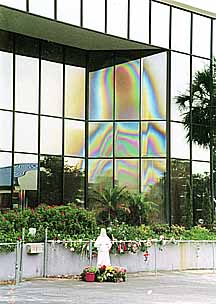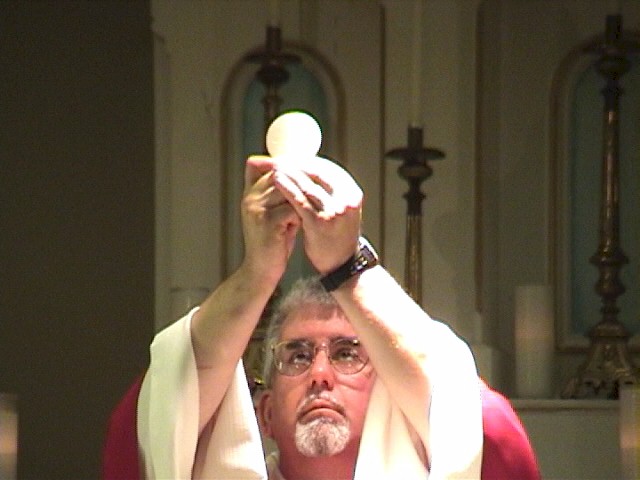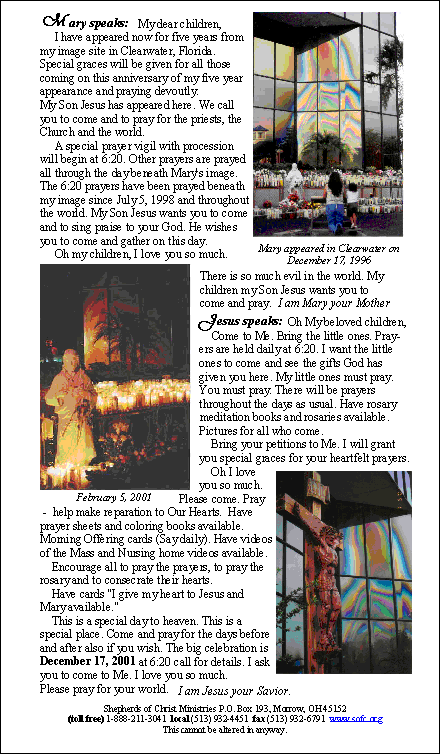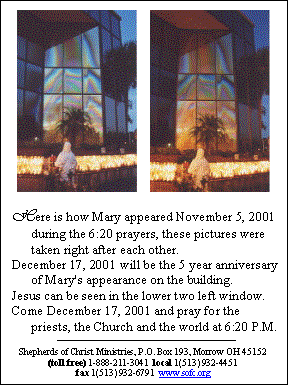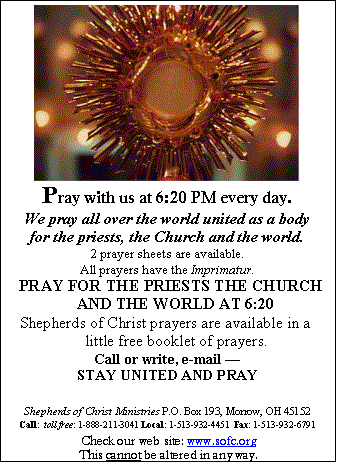Obviously,
we all assimilate the mystery of Christ in basically the same way. There are,
however, significant differences in how each person puts on Christ that result
from the uniqueness of each individual. Each person is a unique expression of
God's creative love. Each person can truthfully say that there has never
before been anyone like himself or herself, there is now no one like him or
her, and there never will be.
The personal
uniqueness of each human being increases in proportion to one's assimilation
to Jesus. That is to say, the more I put on Christ, the more I lose myself in
Christ, the more I become myself. This is true because grace perfects nature,
and, consequently, the more I grow in grace, the more perfect all dimensions
of my person become—and this includes uniqueness. We see, then, how
fallacious is the reasoning of those who think that the more they give
themselves to the practice of religion, the more their personalities will be
subdued. Actually, the opposite is true—the more one grows in Christ, the
more his or her unique personality emerges in all its attractiveness.
As I grow in the
realization of my own uniqueness, I should also grow in developing a sense of
self-identity and self-acceptance. If God in his tremendous love for me has
created the uniqueness that I am, should I not rejoice in who I am and avoid
morbidly comparing myself to others? Should I not have a healthy self-image?
Of course, self-acceptance does not mean self-complacency. Honest
self-reflection will always reveal to me that there are weaknesses that must
be further curbed and strengths that must be further developed.
As God gives each
person his or her uniqueness, he attaches to it a unique mission or role that
is to be accomplished. Cardinal Newman tells us: "Everyone who breathes,
high and low, educated and ignorant, young and old, man and woman, has a
mission, has a work. We are not sent into this world for nothing; we are not
born at random. . . . God sees every one of us; He creates every soul, He
lodges it in a body, one by one, for a purpose. He needs, He deigns to need,
every one of us" (Discourses Addressed to Mixed Congregations, pp.
111-112).
Because of the
uniqueness of each Christian's existence, he or she presents Christ with a
unique opportunity. Each Christian has the vocation to offer Christ his or her
humanity so that Jesus can re-incarnate himself in a new way. Jesus wants to
continue his redemptive work through the not-to-be-repeated newness that is
each Christian's uniqueness. To the extent that an individual Christian offers
his or her humanity to Jesus, he or she has a unique opportunity to continue
the redemption—an opportunity that no one else can offer him or her.
Likewise, to the extent that an individual Christian fails to offer his or her
humanity to Christ, Jesus loses the opportunity that is this Christian's
uniqueness.
Each of us,
consequently, no matter what his or her occupation or status in life might be,
has both the great privilege and the great responsibility to properly utilize
his or her life according to God's Christic design. No one else can fulfill
your unique mission, and, in turn, you cannot accomplish the unique mission of
another. At times we can become somewhat fearful or anxious about the task
that God has entrusted to us as we more deeply realize what it demands. We can
feel the same reluctance that Jeremiah the prophet voiced when Yahweh called
him:
The word of the LORD came to me thus:
"Before I formed you in the
womb I
knew you,
before
you were born I dedicated
you,
a
prophet to the nations I appointed
you."
"Ah, LORD GOD!" I said,
"I
know not how to speak; I am too
young."
But the LORD answered me,
"Say not, 'I am too young.'
To whomever I send you, you shall
go;
Whatever
I command you, you shall
speak.
Have no fear before them,
because
I am with you to deliver
you,
says the LORD."
—Jer 1:4-8
Jeremiah initially
shrank back from the mission that God was giving him. He complained that he
was not capable of accomplishing it. God answered him, however, and told
Jeremiah that he was perfectly capable of fulfilling his appointed role, for
he, Yahweh, would be with Jeremiah. God would work through Jeremiah, and
Jeremiah, for his part, was to be open to God, allowing Yahweh to work through
him according to the divine will.
We, too, can be guilty
of reacting to God's call in the same way that Jeremiah had originally
reacted. This can happen as God calls one to a basic state of life. Once a
person is within a fundamental vocation, one can be tempted to resist God's
call to higher things, to a more complete accomplishment of his or her
mission, and to a greater Christian maturity. When so tempted, a person must
control his or her fears and trustingly give himself or herself to God's will.
Only then will the person become convinced that God never requests anything
without granting abundant grace to accomplish his design, and that, moreover,
to answer God's call as consistently as possible is the only true path to
peace, happiness, and fulfillment, despite the pain that is necessarily
involved.
We are aided in
remaining faithful to the unique role in life that God has given us if we
strive to remain aware of the great value that one life has to Christ,
to the Church, and to the world. History tells us of the great difference that
just one life can have regarding Christ's work; there are outstanding examples
from all walks of life. Surely the Church has been enriched, and countless lay
people have been inspired because of the life of a man named Thomas More. He
was a layman who realized the deepest meaning of life—and he did not fail to
confront the true purpose of human existence, even when that confrontation
meant sacrificing his life for what he believed. Surely this life—the one
life of St. Thomas More—has made a difference. In our own times, we have
been enriched and inspired by an outstanding lay witness—the beloved Dorothy
Day. What an inspiration she has been! Surely her life, though it was only one
life, made a difference—and such a great difference. There are, too, the
examples of men and women who have established religious orders and
congregations. Surely the life of each of them has made an overwhelming
contribution toward a better Church and a better world. Consider also the life
of Angelo Giuseppe Roncalli, a person from a peasant background who eventually
came to be called Pope John XXIII. Surely the world is so much better for Pope
John's having given it his love, kindness, joy, and constant concern. Of
course one life does make a difference.
At this point,
however, many will object that the above examples highlight the lives of
persons who have achieved outstanding recognition in the external order of
things and have commanded great public attention. People who voice this
objection often say that their own lives are so mundane, so hidden, so
incapable of making headlines. Surely, they continue, this rather too ordinary
kind of life makes little difference to Christ, to the Church, and to the
world. Surely it does not much matter whether a person living this kind of
existence fulfills his or her God-given mission. At first glance, many of us
would tend to agree with this reasoning, a reasoning that is really the exact
opposite temptation of what we considered when we likened ourselves to
Jeremiah. In that context there was a question of being tempted to do nothing
because we feared the greatness to which we were called; in the present
context, however, it is a question of being tempted to do nothing because we
think we really have nothing to contribute. Yet, as we begin to reflect in
mature faith, we soon see the fallacy of this objection. We realize that great
external accomplishments or a life that attracts public attention do not, in
and of themselves, make that life great and truly worthwhile. If a Christian
life that is characterized by notable external achievement is truly great and
meaningful for mankind, we know that it is so because the external achievement
has sprung forth from an attitude of deep faith, hope, and love. This, then,
is the ultimate answer to the above objection—every Christian's life, no
matter how ordinary it might be in its external framework, can be tremendously
important and can make an outstanding contribution toward the work of ongoing
redemption as long as it is increasingly consistent with God's will.
God's ways are not
always our ways, and his thoughts are not always our thoughts. God can take a
life that seems so ordinary, so prosaic, so uneventful, and achieve wonders
with it as long as the person is striving to fulfill his or her role in life
according to God's designs. We cannot, then, use the ordinariness of our lives
as an excuse for not making our existence truly great, truly significant for
both Christ and humanity—a life that truly makes a difference. Karl Rahner
has advice for us when the ordinariness of our lives tempts us to think that
our existence is unimportant and almost useless: "Let us take a good look
at Jesus who had the courage to lead an apparently useless life for thirty
years. We should ask him for the grace to give us to understand what his
hidden life means for our religious existence" (Spiritual Exercises,
p. 160). Notice that Rahner describes the first thirty years of Jesus' life as
"apparently useless." In reality, of course, Christ's very
ordinary existence at Nazareth was not actually useless but was, on the
contrary, tremendously important—it was part of his redemptive effort. No,
it is not the ordinary setting of our lives that is an obstacle to our making
a unique and important contribution to the cause of Christ. The real obstacle,
if we allow it, is our failure to relate to life's ordinariness as God
intends.
The realization of the
greatness of our own lives, however, must be balanced with a realization of
the limitations that are attached to that greatness. We are finite creatures
who have various limitations that emanate from our finitude. A sense of
limitations, then, should accompany the fulfillment of our mission in life.
What are some of these
limitations? First, it is important to realize there are false
limitations—limitations that need not be—as opposed to inevitable
limitations—limitations that spring forth from the fact that we are finite
creatures who are immersed in the human condition. An example of a false
limitation is demonstrated by the person who succumbs to the temptation of
wanting to be someone else. This person looks at the physical and intellectual
gifts of one person, the pleasing personality of another, and so forth and so
on, and convinces himself or herself, that, if only he or she were endowed
with such qualities, well, yes, then it would be possible to really
accomplish something with his or her life. In other words, the person fails to
accept himself or herself as God has made him or her. This person fails to
accept his or her God-given uniqueness and wastes precious time looking at
what he or she does not have, rather than appreciating that with which God has
actually endowed him or her. Such a person must accept himself or herself,
once and for all, in his or her fundamental uniqueness. Moreover, this person
must develop the gifts, strengths, and capacities of his or her uniqueness and
strive to control its weaknesses as much as possible. He or she should also
realize that only by accepting his or her uniqueness as coming from God's
creative love and constantly striving to allow that same love to bring his or
her uniqueness to fulfillment will he or she achieve ultimate peace and
happiness. Then, and only then, can a person properly make his or her
contribution to continued redemption.
Surrounding our
uniqueness, then, are limitations that need not be; similarly, there are also
limitations that are inevitable. We possess certain talents, for example, but
present circumstances do not allow us to exercise these talents here and now.
Even at those times when we can exercise our talents, we often feel limited
because we realize that we have only a certain amount of energy; that there
are only a certain number of concrete opportunities and a certain amount of
time for us to use our talents. At other times we feel limited because the
persons we are trying to serve are hostile to our efforts and shut themselves
off from what we desire to so generously offer.
These, then, are some
examples of limitations we can experience in our efforts to fulfill our
mission. To balance the realization of the greatness of our call with the
realization that we will be variously limited—sometimes painfully so—in
our striving to implement our mission is as necessary as it is challenging.
Each Christian,
therefore, because of his or her personal uniqueness, has a unique mission to
fulfill in helping continue the work of Jesus. Each Christian is given the
opportunity to contribute as he or she receives the call from God, and,
obviously, there are varying degrees according to which a Christian may
respond or not respond to God's call. There are, first, those who hardly
respond at all, who seem to be barely Christian. They may have faith, but it
is a dead faith, for they refuse to be guided by God even in serious matters.
They want to be complete masters of their own existence; the less they have to
think about God, the better. Originally, some of these people may have been
given a call to magnificent Christian greatness in this or that state of life.
They may have turned a deaf ear to true greatness, however, and determined to
be makers of their own self-conceived greatness; their concept of greatness
may never have transcended the limits of space and time—they may have
thought and acted as if their temporal existence would extend forever.
Second, there are
other Christians who essentially respond to God, but not as completely as
possible. Their lives seem to be an average mixture of both continuing
faithfulness to God and occasional disloyalty to him; periodically they
accomplish much good, but they also mix in a considerable degree of
mediocrity. They do, however, seem to be basically sincere Christians who do,
in fact, promote the work of Christ and essentially fulfill their roles in
life.
And finally, there are
those Christians who initially answer God's call and continue to answer it in
an eminently generous manner. They develop their uniqueness marvelously and
become forceful shapers of the world's Christic destiny. Their good actions
are deeply etched into the human process, although they may well be hidden
from public acclaim. Because of them and their actions, the world's goodness
is enhanced, and mankind has come considerably closer to fulfilling its
temporal and eternal destinies.
Today's Church needs
more of this type of Christian. The Church and the world in which she is
situated are experiencing a time of crisis—perhaps the most critical time of
all history, for at what other time in human history could life as we know it
on this earth end so suddenly in a nuclear holocaust? Yet, although we live in
an age of special crisis that has tremendous and numerous problems, we also
live in an age of great opportunity. God, for his part, always provides for
the needs of both the Church and the world in which the Church is meant to
serve. Surely, in this age of great need and opportunity, God will not fail to
call Christians of all vocations to completely and eminently dedicate
themselves to the task at hand. We should pray that everyone will respond
according to their own uniqueness and make their own special contribution to
the work of Christ.
